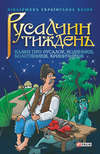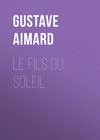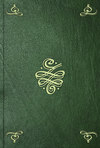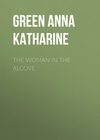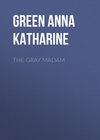Kitabı oku: «Dark Hollow», sayfa 7
XII
SOUNDS IN THE NIGHT
Dearest Mother:
Where could we go that disgrace would not follow us? Let us then accept the judge's offer. I am the more inclined to do this because of the possible hope that some day he may come to care for me and allow me to make life a little brighter for him. The fact that for some mysterious reason he feels himself cut off from all intercourse with his son, may prove a bond of sympathy between us. I, too, am cut off from all companionship with Oliver. Between us also a wall is raised. Do not mind that tear-drop, mamma. It is the last.
Kisses for my comforter. Come soon.
REUTHER.
Over this letter Deborah Scoville sat for two hours, then she rang for Mrs. Yardley.
The maid who answered her summons surveyed her in amazement. It was the first time that she had seen her uncovered face.
Mrs. Yardley was not long in coming up.
"Mrs. Averill—" she began in a sort of fluster, as she met her strange guest's quiet eye.
But she got no further. That guest had a correction to make.
"My name is not Averill," she protested. "You must excuse the temporary deception. It is Scoville. I once occupied your present position in this house."
Mrs. Yardley had heard all about the Scovilles; and, while a flush rose to her cheeks, her eyes snapped with sudden interest.
"Ah!" came in quick exclamation, followed, however, by an apologetic cough and the somewhat forced and conventional remark: "You find the place changed, no doubt?"
"Very much so, and for the better, Mrs. Yardley." Then, with a straightforward meeting of the other's eye calculated to disarm whatever criticism the situation might evoke, she quietly added, "You need no longer trouble yourself with serving me my meals in my room. I will eat dinner in the public dining-room to-day with the rest of the boarders. I have no further reason for concealing who I am or what my future intentions are. I am going to live with Judge Ostrander, Mrs. Yardley;—keep house for him, myself and daughter. His man is dead and he feels very helpless. I hope that I shall be able to make him comfortable."
Mrs. Yardley's face was a study. In all her life she had never heard news that surprised her more. In fact, she was mentally aghast. Judge Ostrander admitting any one into his home, and this woman above all! Yet, why not? He, certainly, would have to have some one. And this woman had always been known as a notable housekeeper. In another moment, she had accepted the situation, like the very sensible woman she was, and Mrs. Scoville had the satisfaction of seeing the promise of real friendly support in the smile with which Mrs. Yardley remarked:
"It's a good thing for you and a very good thing for the judge. It may shake him out of his habit of seclusion. If it does, you will be the city's benefactor. Good luck to you, madam. And you have a daughter, you say?"
After Mrs. Yardley's departure, Mrs. Scoville, as she now expected herself to be called, sat for a long time brooding. Would her quest be facilitated or irretrievably hindered by her presence in the judge's house? She had that yet to learn. Meanwhile, there was one thing more to be accomplished. She set about it that evening.
Veiled, but in black now, she went into town. Getting down at the corner of Colburn Avenue and Perry Street, she walked a short distance on Perry, then rang the bell of an attractive-looking house of moderate dimensions. Being admitted, she asked to see Mr. Black, and for an hour sat in close conversation with him. Then she took a trolley-car which carried her into the suburbs. When she alighted, it was unusually late for a woman to be out alone; but she had very little physical fear, and walked on steadily enough for a block or two till she came to a corner, where a high fence loomed forbiddingly between her and a house so dark that it was impossible to distinguish between its chimneys and the encompassing trees whose swaying tops could be heard swishing about uneasily in the keen night air. An eerie accompaniment, this latter, to the beating of Deborah's heart already throbbing with anticipation and keyed to an unusual pitch by her own daring.
Was she quite alone in the seemingly quiet street? She could hear no one, see no one. A lamp burned in front of Miss Weeks' small house, but the road it illumined (I speak of the one running down to the ravine) showed only darkened houses.
She had left the corner and was passing the gate of the Ostrander homestead, when she heard, coming from some distant point within, a low and peculiar sound which held her immovable for a moment, then sent her on shuddering.
It was the sound of hammering.
What is there in a rat-tat-tat in the dead of night which rouses the imagination and fills the mind with suggestions which we had rather not harbour when in the dark and alone? Deborah Scoville was not superstitious, but she had keen senses and mercurial spirits and was easily moved by suggestion.
Hearing this sound and locating it where she did, she remembered, with a quick inner disturbance, that the judge's house held a secret; a secret of such import to its owner that the dying Bela had sought to preserve it at the cost of his life.
Oh, she had heard all about that! The gossip at Claymore Inn had been great, and nothing had been spared her curiosity. There was something in this house which it behooved the judge to secrete from sight yet more completely before her own and Reuther's entrance, and he was at work upon it now, hammering with his own hand while other persons slept! No wonder she edged her way along the fence with a shrinking, yet persistent, step. She was circling her future home and that house held a mystery.
And yet, like any other imaginative person under a stress of aroused feeling, she might very easily be magnifying some commonplace act into one of terrifying possibilities. One can hammer very innocently in his own house, even at night, when making preparations to receive fresh inmates after many years of household neglect.
She recognised her folly before reaching the adjoining field. But she went on. Where the fence turned, she turned, there being no obstruction to her doing so. This brought her into a wilderness of tangled grasses where free stepping was difficult. As she groped her way along, she had ample opportunity to hear again the intermittent sounds of the hammer, and to note that they reached their maximum at a point where the ell of the judge's study approached the fences.
Rat-tat-tat; rat-tat-tat. She hated the sound even while she whispered to herself:
"It is just some household matter he is at work upon;—rehanging pictures or putting up shelves. It can be nothing else."
Yet on laying her ear to the fence, she felt her sinister fears return; and, with shrinking glances into a darkness which told her nothing, she added in fearful murmur to herself:
"What am I taking Reuther into? I wish I knew. I wish I knew."
BOOK II THE HOUSE AND THE ROOM
XIII
A BIT OF STEEL
"When are you going to Judge Ostrander's?"
"To-morrow. This is my last free day. So if there is anything for me to do, do tell me, Mr. Black, and let me get to work at once."
"There is nothing you can do. The matter is hopeless."
"You think so?"
There was misery in the tone, but the seasoned old lawyer, who had conducted her husband's defence, did not allow his sympathies to run away with his judgment.
"I certainly do, madam. I told you so the other night, and now, after a couple of days of thought on the subject, I am obliged to repeat my assertion. Your own convictions in the matter, and your story of the shadow and the peaked cap may appeal to the public and assure you some sympathy, but for an entire reversal of its opinion you will need substantial and incontrovertible evidence. You must remember—you will pardon my frankness—that your husband's character failed to stand the test of inquiry. His principles were slack, his temper violent. You have suffered from both and must know. A poor foundation I found it for his defence; and a poor one you will find it for that reversal of public opinion upon which you count, without very strong proof that the crime for which he was punished was committed by another man. You think you have such proof, but it is meagre, very meagre. Find me something definite to go upon and we will talk."
"Discouragement; discouragement everywhere," she complained. "Yet I know John to have been innocent of this crime."
The lawyer raised his brows, and toyed impatiently with his watch-chain. If her convictions found any echo in his own mind, he gave no evidence of it. Doubtfully she eyed him.
"What you want," she observed at length, with a sigh, "is the name of the man who sauntered down the ravine ahead of my husband. I cannot give it to you now, but I do not despair of learning it."
"Twelve years ago, madam; twelve years ago."
"I know; but I have too much confidence in my cause to be daunted even by so serious an obstacle as that. I shall yet put my finger on this man. But I do not say that it will be immediately. I have got to renew old acquaintances; revive old gossip; possibly, recall to life almost obliterated memories."
Mr. Black, dropping his hand from his vest, gave her his first look of unqualified admiration.
"You ring true," said he. "I have met men qualified to lead a Forlorn Hope; but never before a woman. Allow me to express my regret that it is such a forlorn one." Then, with a twinkle in his eye which bespoke a lighter mood, he remarked in a curiously casual tone.
"Talking of gossip, there is but one person in town who is a complete repository of all that is said or known this side of Colchester." (The next town.) "I never knew her to forget anything; and I never knew her to be very far from the truth. She lives near Judge Ostrander—a quaint little body, not uninteresting to talk to; a regular character, in fact. Do you know what they say about her house? That everything on God's earth can be found in it. That you've but to name an object, and she will produce it. She's had strange opportunities for collecting odds and ends, and she's never neglected one of them. Yet her house is but a box. Miss Weeks is her name."
"I will remember it."
Mrs. Scoville rose. Then she sat down again, with the remark:
"I have a strange notion. It's a hard thing to explain and you may not understand me, but I should like to see, if it still exists, the stick—my husband's stick—with which this crime was committed. Do the police retain such things? Is there any possibility of my finding it laid away in some drawer at Headquarters or on some dusty shelf?"
Mr. Black was again astonished. Was this callousness or a very deep and determined purpose.
"I don't know. I never go pottering about at Headquarters. What do you want to see that for? What help can you get out of that?"
"None probably; but in the presence of defeat you grasp at every hope. I dreamt of that stick last night. I was in an awful wilderness, all rocks, terrific gorges and cloud-covered, unassailable peaks. A light—one ray and one only—shone on me through the darkness. Towards this ray I was driven through great gaps in the yawning rocks and along narrow galleries sloping above an unfathomable abyss. Hope lay beyond, rescue, light. But a wall reared its black length between. I came upon it suddenly; a barrier mighty and impenetrable with its ends lost in obscurity. And the ray! the one long beam! It was still there. It shone directly upon me from an opening in this wall. It marked a gate,—a gate for which I only lacked the key. Where should I find one to fit a lock so gigantic! Nowhere! unless the something which I held—which had been in my hands from the first—would be found to move its stubborn wards. I tried it and it did! it did! I hear the squeak of those tremendous hinges now, and—Mr. Black, you must have guessed what that something was. My husband's stick! the bludgeon with whose shape I was so familiar twelve years ago! It is that and that only which will lead us to the light. Of this I feel quite sure."
A short and ironical grunt answered her. Mr. Black was not always the pink of politeness even in the presence of ladies.
"Most interesting," he commented sarcastically. "The squeak you heard was probably the protest of the bed you were reclining on against such a misuse of the opportunities it offered you. A dream listened to as evidence in this office! You must have a woman's idea of the value of my time."
Flushing with discomfiture, she attempted to apologise, when he cut her short. "Nevertheless, you shall see the stick if it is still to be found. I will take you to Police Headquarters if you will go heavily veiled. We don't want any recognition of you there YET."
"You will take me—"
"The fact that I never go there may make my visit not unwelcome. I'll do it; yes, I'll do it."
"Mr. Black, you are very good. How soon—"
"Now," he announced, jumping up to get his hat. "A woman who can take up a man's time, with poetry and dreams, might as well have the whole afternoon. Are you ready? Shall we go?"
All alacrity, in spite of the irony of his bow and smile, he stood at the door waiting for her to follow him. This she did slowly and with manifest hesitation. She did not understand the man. People often said of her that she did not understand her own charm.
There was one little fact of which Mr. Black was ignorant;—that the police had had their eye on the veiled lady at Claymore Inn for several days now and knew who his companion was the instant they stepped into Headquarters. In vain his plausible excuses for showing his lady friend the curiosities of the place; her interest in the details of criminology was well understood by Sergeant Doolittle, though of course he had not sounded its full depths, and could not know from any one but Judge Ostrander himself, her grave reasons for steeping her mind again in the horrors of her husband's long-since expiated crime. And Judge Ostrander was the last man who would be likely to give him this information.
Therefore, when he saw the small, mocking eye of the lawyer begin to roam over the shelves, and beheld his jaw drop as it sometimes did when he sought to veil his purpose in an air of mild preoccupation, he knew what the next request would be, as well as if the low sounds which left Mr. Black's lips at intervals had been words instead of inarticulate grunts. He was, therefore, prepared when the question did come.
"Any memorial of the Etheridge case?"
"Nothing but a stick with blood-marks on it. That, I'm afraid, wouldn't be a very agreeable sight for a lady's eye."
"She's proof," the lawyer whispered in the officer's ear. "Let's see the stick."
The sergeant considered this a very interesting experience—quite a jolly break in the dull monotony of the day. Hunting up the stick, he laid it in the lawyer's hands, and then turned his eye upon the lady.
She had gone pale, but it took her but an instant to regain her equanimity and hold out her own hand for the weapon.
With what purpose? What did she expect to see in it which others had not seen many times? She did not know, herself. She was simply following an impulse, just as she had felt herself borne on by some irresistible force in her dream. And so, the three stood there, the men's faces ironic, inquisitive, wondering at the woman's phlegm if not at her motive; hers, hidden behind her veil, but bent forward over the weapon in an attitude of devouring interest. Thus for a long, slow minute; then she impulsively raised her head and, beckoning the two men nearer, she directed attention to a splintered portion of the handle and asked them what they saw there.
"Nothing; just stick," declared the sergeant. "The marks you are looking for are higher up."
"And you, Mr. Black?"
He saw nothing either but stick. But he was little less abrupt in his answer.
"Do you mean those roughnesses?" he asked. "That's where the stick was whittled. You remember that he had been whittling at the stick—"
"Who?"
The word shot from her lips so violently that for a moment both men looked staggered by it. Then Mr. Black, with unaccustomed forbearance, answered gently enough:
"Why, Scoville, madam; or so the prosecution congratulated itself upon having proved to the jury's satisfaction. It did not tally with Scoville's story or with common sense I know. You remember,—pardon me,—I mean that any one who read a report of the case, will remember how I handled the matter in my speech. But the prejudice in favour of the prosecution—I will not say against the defence—was too much for me, and common sense, the defendant's declarations, and my eloquence all went for nothing."
"Of course they produced the knife?"
"Yes, they produced the knife."
"It was in his pocket?"
"Yes."
"Have they that here?"
"No, we haven't that here."
"But you remember it?"
"Remember it?"
"Was it a new knife, a whole one, I mean, with all its blades sharp and in good order?"
"Yes. I can say that. I handled it several times."
"Then, whose blade left that?" And again she pointed to the same place on the stick where her finger had fallen before.
"I don't know what you mean." The sergeant looked puzzled. Perhaps, his eyesight was not very keen.
"Have you a magnifying-glass? There is something embedded in this wood. Try and find out what it is."
The sergeant, with a queer look at Mr. Black, who returned it with interest, went for a glass, and when he had used it, the stare he gave the heavily veiled woman drove Mr. Black to reach out his own hand for the glass.
"Well," he burst forth, after a prolonged scrutiny, "there is something there."
"The point of a knife blade. The extreme point," she emphasised. "It might easily escape the observation even of the most critical, without such aid as is given by this glass."
"No one thought of using a magnifying-glass on this," blurted out the sergeant. "The marks made by the knife were plain enough for all to see, and that was all which seemed important."
Mr. Black said nothing; he was feeling a trifle cheap;—something which did not agree with his crusty nature. Not having seen Mrs. Scoville for a half-hour without her veil, her influence over him was on the wane, and he began to regret that he had laid himself open to this humiliation.
She saw that it would be left for her to wind up the interview and get out of the place without arousing too much attention. With a self-possession which astonished both men, knowing her immense interest in this matter, she laid down the stick, and, with a gentle shrug of her shoulders, remarked in an easy tone:
"Well, it's curious! The inns and outs of a crime, I mean. Such a discovery ten years after the event (I think you said ten years) is very interesting." Then she sighed: "Alas! it's too late to benefit the one whose life it might have saved. Mr. Black, shall we be going? I have spent a most entertaining quarter of an hour."
Mr. Black glanced from her to the sergeant before he joined her. Then, with one of his sour smiles directed towards the former, he said:
"I wouldn't be talking about this, sergeant. It will do no good, and may subject us to ridicule."
The sergeant, none too well pleased, nodded slightly. Seeing which, she spoke up:
"I don't know about that, I should think it but proper reparation to the dead to let it be known that his own story of innocence has received this late confirmation."
But the lawyer continued to shake his head, with a very sharp look at the sergeant. If he could have his way, he would have this matter stop just where it was.
Alas! he was not to have his way, as he saw, when at parting he essayed to make a final protest against a public as well as premature reopening of this old case. She did not see her position as he did, and wound up her plea by saying:
"The public must lend their aid, if we are to get the evidence we need to help us. Can we find the man who whittled that stick? Never. But some one else may. I am going to give the men and women of this town a chance. I'm too anxious to clear my husband's memory to shrink from any publicity. You see, I believe that the real culprit will yet be found."
The lawyer dropped argument. When a woman speaks in that tone, persuasion is worse than useless. Besides, she had raised her veil. Strange, what a sensitive countenance will do!

